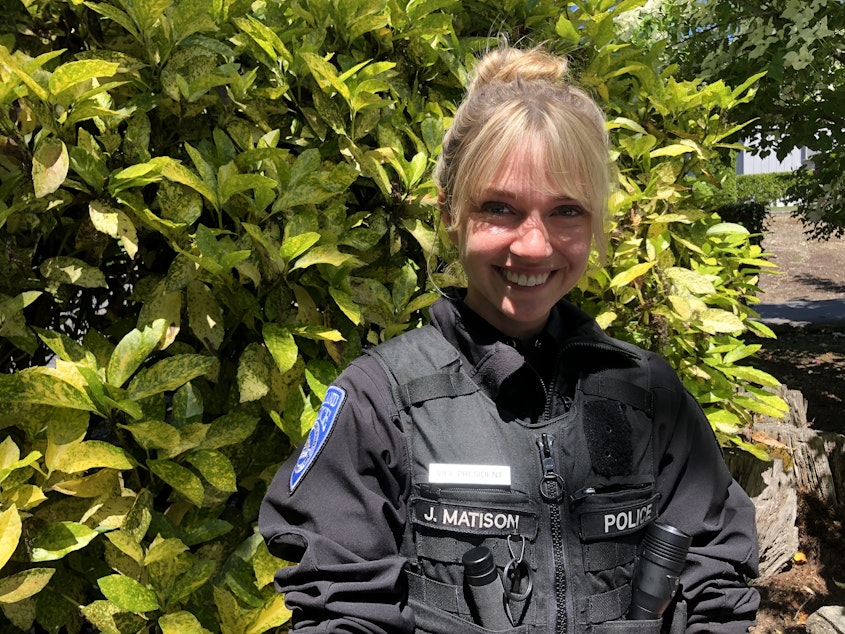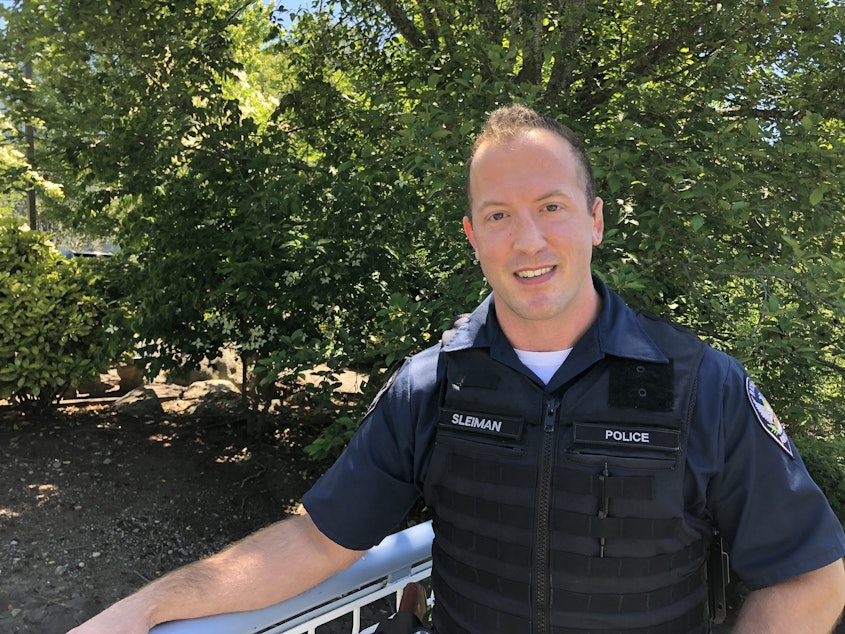Washington rolls out 'duty to intervene' training for new police recruits

The murder of George Floyd by Minneapolis police officer Derek Chauvin ignited national protests and prompted a nationwide conversation about police brutality.
Members of the public have also asked why the other officers present at the scene didn’t intercede as Chauvin knelt on Floyd’s neck for more than nine minutes. Those officers are charged with aiding and abetting that crime.
A new law in Washington State requires members of law enforcement to intervene when they see excessive force, and to report wrongdoing. Instructors at the state academy emphasize that intervening is an act of loyalty to the colleague involved, to the officer’s agency, and their community.
Police recruits in Washington are just starting to return to in-person training at the Criminal Justice Training Center in Burien. And they’re attending a new training titled, “Active Bystandership for Law Enforcement.”
The training is meant to help police officers navigate the delicate mission of speaking up when they think colleagues or superiors are making a mistake. Instructor Ian Edwards says officers need to have “the integrity to tell someone what they need to hear, rather than what they want to hear.”
Last week, speaking to a classroom of 30 new recruits, Edwards describes real cases: an officer who lost her temper and used excessive force on a restrained man; an officer who was sleep-deprived from working long hours and mocked a murder victim; and an officer who made lethal errors in failing to correctly search and handcuff a suspect.
“All of this is preventable. All of it!” Edwards tells them.
Sponsored
In each case, colleagues were on the scene and could have intervened – later the officers involved asked why no one did. Edwards reminds the group that members of the public often can’t interfere – they’d face arrest themselves.
“The best person to help a fellow officer is you – who’s built the trust, built the rapport,” he tells the class.
Training to be an officer
Those are hard conversations to have, and instructors acknowledge that in their own experience, colleagues sometimes feel defensive and react badly. Edwards says research suggests that the larger the group, the less willing an individual can be to intervene – because they doubt themselves or think someone else will handle it. He adds that there are helpful strategies, like proactively giving your colleagues permission to say something if they ever think you’re making a mistake.
Jonathan Kloke is a recruit for the Thurston County Sheriff’s Office. He says he’s already had that conversation with his classmates.
Sponsored
“A lot of this is new for me,” he said. “I never intended to go into law enforcement. So I asked my partners, ‘Please point out when I’m doing something wrong. Correct me here.' I’d rather do it here than once I’m out of the academy.”
James Sleiman is headed to the Richland Police Department. He says the curriculum puts peer intervention in the context of officer wellness. It stresses that officers should look out for behavior changes that suggest their colleagues are sleep-deprived, depressed, or just not themselves.
"One of the takeaways that I’ve seen from this class that I like is adequate use of emotional intelligence, and emotional health and wellbeing at a holistic level," Sleiman said.

Jennifer Matison is a recruit with Kirkland police. She previously spent four years in the department as an animal control officer. She says that she believes her agency will support officers who speak up in these situations.
Sponsored
“We have each other’s backs, we have our community’s backs, we want to be serving our community to the highest standard,” she said.
“And if we have a bad day and say we’re short-tempered, that’s why we have partners. Let them help us help others.”
She says speaking up to superiors could be difficult, "but I feel that if you don’t do that, are you helping them be good leaders?”
Matison added that her three children played a role in her decision to enter law enforcement at a fraught time.
“I look at my daughters and I say 'you know what, I feel like I can help with this change, I feel like there is a change to be made and I want to be part of that.'”
Sponsored
Duty to intervene
The academy had already adopted this intervention training, developed by Georgetown Law School, before legislators enacted the “duty to intervene” policy for officers who observe excessive force. Officers can now be decertified for failing to report wrongdoing by a fellow officer.
Bart Hayes is the advanced training manager for the academy. He says this training means the academy could hit the ground running once the new law passed.
“I like how it not only helps prevent misconduct or alleged misconduct, it helps make us better as a profession, it helps reduce mistakes and it can help with officer safety,” he said.
Hayes says the program resembles efforts to reduce mistakes in aviation and hospital operating rooms – other high-stakes environments where subordinates need to be empowered to speak up if they see a problem, and protected from retaliation.
Sponsored
The scarcity of new police officers has also changed a workplace culture where input from subordinates was traditionally discouraged or dismissed, according to Hayes. He adds that when he started at the Tacoma Police Department in the 1990s, there was one year when the department lost 60 new recruits.
“You can’t tell me all 60 of those weren’t supposed to be cops,” he said.
Now, commanders are putting more emphasis on emotional intelligence and listening more to their newer officers, who will be highly valued by their employers.
“They’re worth their weight in gold,” Hayes said.
That could make it easier for newer officers to speak up about perceived problems.
The new law was a priority for the Washington Coalition for Police Accountability. After the law was passed, Marilyn Covarrubias, whose son Daniel was shot by Lakewood police in 2015, said families and communities will be watching carefully over its implementation.
“We have to hold [police] to the standards that have been put in place now,” she said as the legislative session ended in April. “We can’t let this happen anymore.”
Law enforcement groups generally supported the new law as well, although some worry that officers could be reported for violating other departments’ policies, if a scene involves multiple agencies. The academy’s interim Executive Director Monica Alexander says that’s less likely to happen if all officers strive to use the minimal force necessary, and to step in if someone exceeds it.
“And I know talking through it I make it sound simple,” she said. “It’s not always that simple and I understand that. But that’s how we have to start thinking.”
She says tracking the number of excessive force complaints that are sustained could be a good measure of whether the new “active bystander” training is living up to its promise.
The law requires that in the coming months all agencies adopt written “duty to intervene” policies and all officers receive the training. Agencies can also become ABLE-certified. So far those include Everett, Seattle, Renton, Auburn and Bellevue.
Criteria include having policies to prohibit and investigate retaliation if an officer intervenes, and offering a “meaningful officer wellness program” including access to professional counselors.
If you have any feedback on this story, you can email me at aradil@kuow.org or find me on Twitter @AmyRadil. Or you can just click the feedback button on the right hand side of this page.




